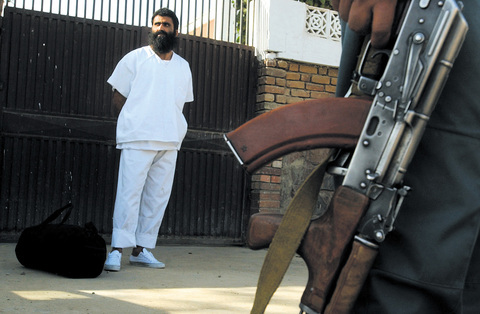Seven Afghans freed after up to five years of detention at the US naval base at Guantanamo Bay arrived in Kabul on Saturday, desperate to get back to their home villages.
The long-bearded men, mostly farmers and simple villagers, dressed in dark blue jeans and jackets, arrived at the offices of the Afghan Commission for Peace and Reconciliation here to receive an official guarantee of freedom from the Afghan government.
Most of them were from Helmand, the southern province that has become the most volatile area of Afghanistan.

PHOTO: AP
Government and foreign troops there have come under repeated attack by the Taliban and other insurgents.
One of the seven men, Haji Alef Muhammad, 62, from the Baghran district in Helmand, said he lost his brothers four years ago in a US bombardment of his village.
After that, he said, he was taken into custody during a raid, and sent to Guantanamo.
"Is this my fault that I believe in the words, `There is no God but Allah?'" he said. "Other than that there is no witness and no evidence of my guilt."
"We had to eat, pray and go to the toilet in the same cell that was 2 meters long and 2 meters wide," he said in disgust.
Another prisoner, Abdul Rahman, 38, said he was an unwilling fighter for the Taliban.
He said that he was from Helmand, but had been arrested in Kunduz Province in northern Afghanistan in late 2001 by Northern Alliance soldiers led by the Uzbek leader General Abdul Rashid Dostum.
"The Taliban sent me there by force as they made every family provide one fighter or give money instead," he said.
He said he had been taken into custody in the city of Kunduz, held in the town of Sheberghan, and then "sold" to the US military.
Another returning Afghan, Haji Baridad, who said he did not know his age, spent five years in Guantanamo.
He appeared disturbed and kept complaining that an Afghan translator took his money -- 3,600 Pakistani rupees, or about US$62 -- while he was detained.
"Ask Hazrat Mojadidi what was our crime?" he said, referring to the head of the Afghan commission.
This was the eighth round of prisoner releases from Guantanamo under a reconciliation program begun 20 months ago by the Afghan government.
Forty-seven Afghans have been released from Guantanamo in that time, and 70 remain.
Others are held at the Bagram air base, north of Kabul.
A new prison wing is under construction in Kabul to house Afghan detainees from Guantanamo who are not freed.
The talks for handing over the Afghan inmates from US prisons to Afghanistan custody have slowed in recent months.
Sebaghatullah Mojadidi, the head of the peace and reconciliation commission, said they had worked for almost a year to prepare the prison so the Afghan detainees could be brought home.
"It is not in our hand, it is in the Americans' hands," he told the seven men during a speech.
But the seven were allowed to go home.

‘EYE FOR AN EYE’: Two of the men were shot by a male relative of the victims, whose families turned down the opportunity to offer them amnesty, the Supreme Court said Four men were yesterday publicly executed in Afghanistan, the Supreme Court said, the highest number of executions to be carried out in one day since the Taliban’s return to power. The executions in three separate provinces brought to 10 the number of men publicly put to death since 2021, according to an Agence France-Presse tally. Public executions were common during the Taliban’s first rule from 1996 to 2001, with most of them carried out publicly in sports stadiums. Two men were shot around six or seven times by a male relative of the victims in front of spectators in Qala-i-Naw, the center

Canadian Prime Minister Mark Carney is leaning into his banking background as his country fights a trade war with the US, but his financial ties have also made him a target for conspiracy theories. Incorporating tropes familiar to followers of the far-right QAnon movement, conspiratorial social media posts about the Liberal leader have surged ahead of the country’s April 28 election. Posts range from false claims he recited a “satanic chant” at a campaign event to artificial intelligence (AI)-generated images of him in a pool with convicted sex offender Jeffrey Epstein. “He’s the ideal person to be targeted here, for sure, due to

Incumbent Ecuadoran President Daniel Noboa on Sunday claimed a runaway victory in the nation’s presidential election, after voters endorsed the young leader’s “iron fist” approach to rampant cartel violence. With more than 90 percent of the votes counted, the National Election Council said Noboa had an unassailable 12-point lead over his leftist rival Luisa Gonzalez. Official results showed Noboa with 56 percent of the vote, against Gonzalez’s 44 percent — a far bigger winning margin than expected after a virtual tie in the first round. Speaking to jubilant supporters in his hometown of Olon, the 37-year-old president claimed a “historic victory.” “A huge hug

DISPUTE: Beijing seeks global support against Trump’s tariffs, but many governments remain hesitant to align, including India, ASEAN countries and Australia China is reaching out to other nations as the US layers on more tariffs, in what appears to be an attempt by Beijing to form a united front to compel Washington to retreat. Days into the effort, it is meeting only partial success from countries unwilling to ally with the main target of US President Donald Trump’s trade war. Facing the cratering of global markets, Trump on Wednesday backed off his tariffs on most nations for 90 days, saying countries were lining up to negotiate more favorable conditions. China has refused to seek talks, saying the US was insincere and that it